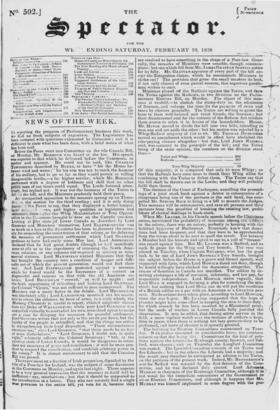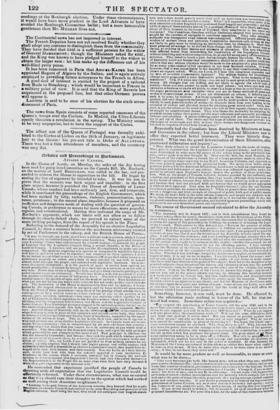NEWS OF THE WEEK.
'XIIN reporting the progress of Parliamentary business this week, we find no fresh subjects of exposition. The Legislature has been cccupied with questions exhausted by discussion ; and it is shtlicient to state what has been done, with a brief notice of what has been said. Before the-Peers went into Committee on the vile Canada Bill, on Monday, Mr. ROEBUCK was heard at the bar. His speech vu superior to that which he delivered before the Commons, in matter and manner. He could not be said, like CHARLES Tow:imam) described by BUREE, to have " bit the House be- tween wind and water ;" for his aim was not to catch the humour of his auditory, but to go as far as they would permit in telling disagreeable truths,—a far higher service; which Mr. ROEBUCK performed with a degree of boldness and skill that no other public man of our times could equal. The Lords listened atten- tively, but replied not. It was not the business of the Tories to der:;:d the bill, and the Ministers prudently held their peace.
An unexpected opposition to the measure sprang up on Thurs- dsa...a the motion for the third reading ; and it is only doing Juliet • 1. the Peers to say, that they displayed a better temper,
more ei:la.;!, 1 ,e,vs, and higher qualities as legislators and statestuen,thain L.ther the Whig Ministerialists or Tory Opposi- sition in the Coiinhons brought to bear on the Canada question. Looking at Ithe state of Lower Canada as described by Lord GOSFORD and Ministers themselves, Lord ELLENBORMIGH was u much at a loss as the Spectator has been to .discover the neces- sity for suspending the constitution of that colony, or for dela) ing the measure of permanent settlement which Lord GLENELG professes to have had ready since May last. Lord ASHBURTON declared that he had great doubts (though lie had manifestly none at all) as to the expediency of retaining the North Ame- rican colonies, or any colonies not required as military or com- mercial stations. Lord MANSFIELD warned Ministers that they hail brought the country into a condition of danger and diffi- culty out of which the present generation would not find their way. And Lord FITZWILL1AM protested against a measure which he feared would be the forerunner of a contest as disgraceful and ruinous as that with the old American co- lonies. Lord BROUGHAM " crowed," as well he might ; and the fresh opportunity of ridiculing and lashing Lord GLENELG, the Colonial "Cicero," was not suffered to pass unimproved. The Ministers cut a mean fignie in the debate. Lord Mstricluatss was absolutely silly ; Lord LANSDOWNE mouthed out his resolu- tion to retain the colonies by force of arms, in a style which, the Horning Chronicle is careful to report, elicited emphatic cheers from the Duke of WELLIsraton; while poor Lord Gi.Esrs.td was compelled virtually to contradict his own accredited agent to make out a case for delaying his measures for peaceful settlement. Lord Goseoao writes that not only is the revolt put down, but the loyalty of the people is rekindled, and that the clergy are active ia strengthening their loyal disposition. "These circumstances convince me," says Lord GOSFOltD, "that there needs be no fear of more disturbances.' "Lord Gosecnte, 1 doubt not, is quite right," solemnly affirms the Colonial Secretary ; " but, in the existing state of Lower Canada, it would be dangerous to intro- duce my measures of race and conciliation : it will be more pru- dent to suspend the constitution, and establish arbitrary power in the colony.' It is almost unnecessary to add, that the Coercion Bill was passed. The experiment on a fraction of Irish pauperism, dignified by the title of a Poor-law for Ireland, was the subject of some discussion in the Commons on Monday, and again last night. There appears to be a very general impression that the measure in itself will be inefficient—nay, mischievous ; but that it should be supported as the introduction to a better. They who can scarcely find a single lkse provision in the entire bill, yet vote for it, because they are resolved to have something in the shape of a Poor-law. Gene- rally, the remarks of Members were sensible, though common- place; but one which fell from Mr. J AYES GR arrs N deserves notice for its folly. Mr. Gusrrms approves of every part of the bill ex- cept the Emigration clause, which he recommends Ministers to strike out ! The provision that gives the small meagure its best, if not only chance of even partial success, this sagacious gentle-
man wishes to omit. _ - - -- -
Ministers played off the Radicals against the Tories, and them the Tories against the Radicals, in two divisions on the Parlia- mentary Electors Bill, on Monday. The object of this mea- sure is twofold,—to abolish the stamp-duty on the admission of freemen, and enlarge the time for the pay went of rates and taxes by electors generally. The Tories are willing to grant the boon to their well-beloved and venal friends, the freemen ; but their disinterested zeal for the entirety of the Reform Act renders them averse to relax it in favour of the householders. Hence, Mr. H1NDE moved to divide the bill into two bills, intending to pass one and set aside the other : hut his motion was rejected by a Whig-Radical majority of 158 to 68. Mr. THOMAS Doncomas moved an amendment which would in effect have abolished the rate-paying clauses altogether : but that, Lord JOHN Russma. said, was contrary to the principle of the bill ; and the Tories being of the same opinion, the numbers on the division stood thus—
Tories and Whigs 206
Radicals 107 Tory-Whig Majority 99 Of this majority, it is computed that only 88 were Whigs; so that the Radicals have once more to thank their Whig allies for combining with the Tories to defeat them. The Tories say that the bill shall be thrown out in the Lords; and they will probably fulfil their threat.
The decision of the Court of Exchequer, annulling the proceed- ings of a joint stuck bank against a debtor in consequence of a clergyman being one of the partners in the said bank, has com- pelled Mr. SPRING Rica to bring in a bill to muzzle the Judges. This measure will be retrospective, and save all parsons and their partners from the penalties of breaking the existing law, prohi- bitory of clerical dealings in bank-stock.
When Mr. Lesrunt, in his Canada speech before the Chriitmas recess, mentioned the probability of desertion among the .:tddit.'i in the colony, there was an outcry, perfectly in keeping with the habitual hypocrisy of Parliament. Everybody knew that deser- tions had been frequent, and that they were to be apprehended from the troops about to be sent to quell the revolt. Yet because a Member had the honesty and spirit to say so, a yell of" treason" was raised against him. But Mr. LEADER was a Radical, and as such fit game for the Whig and Tory hounds. The case was altered on Tuesday, when Captain BOLDER°, who has the good luck to be one of Lord JOHN RUSSELL'S Tory friends, brought the subject before the House in a grave and formal speech, well supported with facts, which Lord Howicu dared not deny, though he would willingly have shirked the discussion altogether. The causes of desertion in Canada are manifest. The soldier by de- serting exchanges a life of restraint, inferiority, and low pay, for respectable independence. Lord HOWICH states vaguely, that Lord HILL is engaged in devising a plan for remedying the mis- chief: but nothing that Lord HILL can do will put the condition of a British soldier on a par with an American or a Canadian pea- sant. No desertions have taken place, according to Lord Howlett, since the war began. Mr. LEADER suggested that the hope of plunder might have some cffect in keeping the men to their duty : for which remark he has been assailed by a Ministerial print; but the mode of warfare in Lower Canada fully justified the observation. It may be added, that during active service in the field, a more vigilant watch over the motions of soldiers is kept, than in peace, when there is nothing but lazy garrison-duty to be performed, and leave of absence is frequently granted. The balloting for Election Committees commenced on Tiles- day. B oh parties mustered in considerable force; the numbers present on that day buing 361. Committees for the trial of peti- tions against the returns for Roxburgh county, Ipswich, and Sal- ford, were chosen ; and on Thursday the Longford Committee was named. The Ipswich Committee consists of six Tories and five Liberals ; but in the others the Liberals had a majority; and the result may therefore be anticipated as adverse to the Tories, Oil the petitions of the present week. Indeed, Mr. BROTHERTON'S seat for Salfoid was sccured by the first decision of the Com- mittee, and he was declared duly elected. Lord Advaeata MURRAY IS chairman of the Roxburgh Committee, although it is not usual for the immediate connexions of the Government to sit on Election Committees, and although it happens that Mr. MURRAY was himself implicated in some degree with the pro-
ceedings at the Roxburgh election. Under these circumstances, it would have been more prudent in the Lord Advocate to have avoided the Roxburgh Committee ballot ; but a more honourable gentleman than Mr. MURRAY lives not.



























 Previous page
Previous page